What is inclusive education?
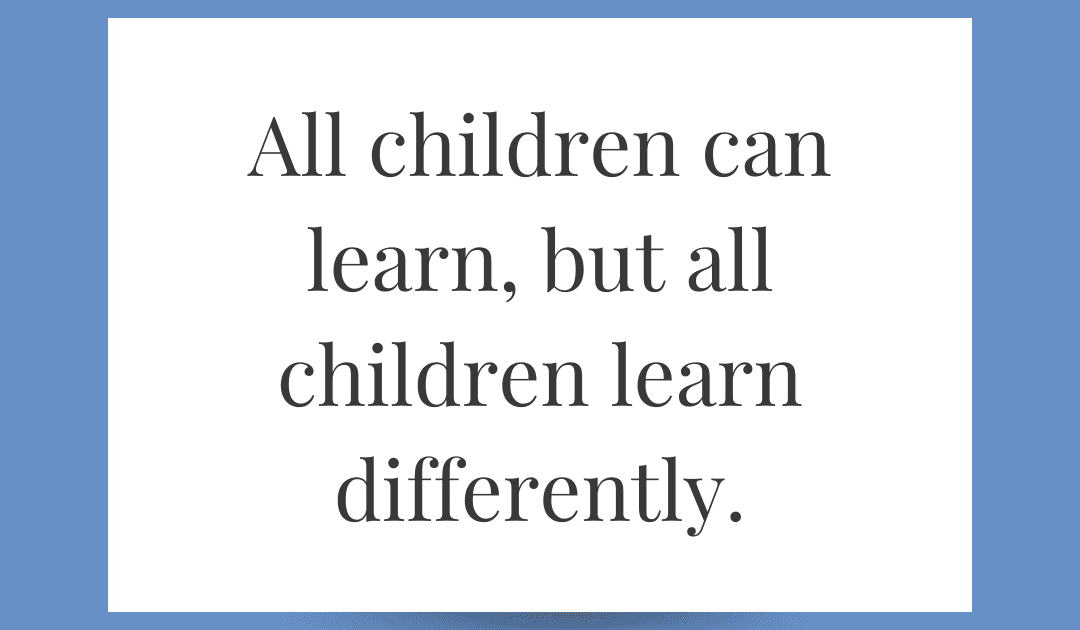
“Inclusive education means that all students attend and are welcomed by their neighbourhood schools in age-appropriate, regular classes and are supported to learn, contribute and participate in all aspects of the life of the school.”(1)
What does this really mean? It’s simple.
All children can learn, but all children learn differently. Every child should attend mainstream school in a common learning environment with their same-age peers regardless of perceived ability or level of disability. All children benefit from inclusive education because all children belong.
One of the most important features of inclusive schools is that all students of different abilities are taught in a common learning environment for the majority of regular instruction hours. In other words, simply housing children with disabilities in the same school building as their peers but keeping them segregated for the majority of the day does not count as inclusive education. Curriculum development that assumes competence and sets high standards for all students while developing learning goals that are in accordance with each child’s abilities is a key feature of inclusion. The cookie-cutter approach to teaching and learning is obsolete. Children do not all need to have the same educational goals to learn and grow together in a regular classroom.
We must shift the perspective from how to best educate children with disabilities to how to best educate all students in the same environment in ways that are meaningful to all. Inclusion is about considering the whole child, from academics to emotional intelligence, social skills, and more, and finding ways to include every student in the classroom. All aspects of the school environment must be considered, from the physical school building, to teacher training and support staff, curriculum design and implementation.
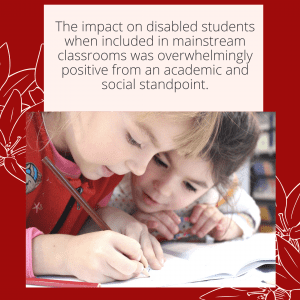
But does it work?
One of the most frequent sentiments expressed when inclusive education is discussed is that of “It sounds great, but does it actually work?”
The short answer is YES, and there is over 30 years of research to back it up.
A common fear of opening up classrooms to children with disabilities or behavioural concerns is that their needs will affect the learning environment and negatively impact the academic achievement of their peers. This has been proved to be false several times over. A 2013 study compared the achievement of 202 low, average, and high achieving students in classrooms in which students with disabilities were present, and an equal number of students in classrooms where they were not. There was no significant difference in the academic achievement progress of any of the students from classrooms with or without inclusion of disabled students.(2)
Earlier research found similar results. In 2007, researchers from the University of Manchester systematically reviewed a set of studies from 26 studies from the United States, Australia, Canada, and Ireland, and found that 81% of study findings indicated that nondisabled students either experienced no effects (58%) or experienced positive effects (23%) on their academic development as a result of being educated alongside students with disabilities,”(3)
The impact on disabled students when included in mainstream classrooms was overwhelmingly positive from an academic and social standpoint. A study of over 1300 students within 180 school districts in the United States showed a strong relationship between the amount of time spent in general education classes and achievement in math and reading. A different study looking at the outcomes of 11,000 students in the United States showed that regardless of disability, more time spent in a general education classroom correlated with fewer absences, fewer referrals for misbehavior, and more post-secondary and employment options.(4)
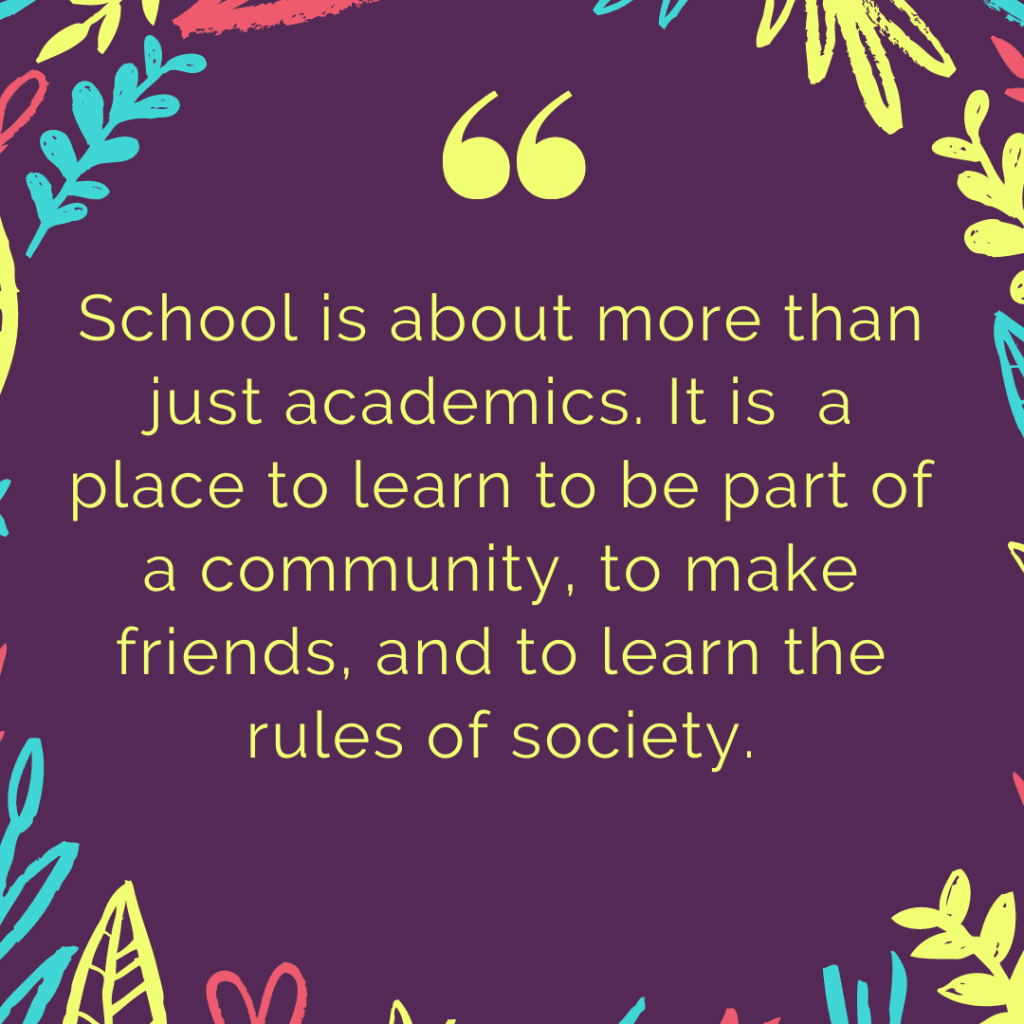
What are the benefits of inclusion for all children?
As most school brochures will tell you, school is about more than just academics. It is a place to learn to be part of a community, to make friends, and to learn the rules of society. Schools offer activities outside the classroom such as sports, artistic activities, field trips, and other social activities that are often off-limits to children in segregated special education classrooms. Likewise, inclusive education practices result in benefits that extend beyond that of academic achievement. For ALL children, the benefits of inclusion include: opportunities for diverse friendships, improved social skills and wider social networks, peer modeling that works both ways, problem solving skills, positive self-image, acceptance and respect for others, increased understanding and acceptance of difference, shared learning opportunities, and better readiness for inclusion outside of the school environment.(5)
If one of the functions of school is to prepare children for life in society as adults, the importance of inclusion for all becomes even more apparent. If disabled individuals are segregated in the mainstream education system as children, what place is there for them in society as adults? Inclusive education prepares all students for adult life in an inclusive society, by affirming that disabled individuals are full members of society with their own individual strengths, weaknesses, needs, and gifts to offer the world just like their non-disabled peers. When every individual is supported to achieve their full potential, everyone benefits.
Resources
- What is Inclusive Education?
- 7 New Research Studies to Help you Win the Fight for Inclusion
- The impact of placing pupils with special educational needs in mainstream schools on the achievement of their peers.
- 7 Research Studies to Help you Win the Fight for Inclusion
- The Benefits of Inclusion in the Classroom | Community Living Toronto (cltoronto.ca)
Kathleen Sperduti
Kathleen Sperduti is a wife and mother of two boys, Xavier and Etienne. A former high school teacher, she currently works freelance part-time and dedicates the rest of her time to supporting EKIPP and the families it serves.
Erin Reeser
Erin Reeser is a wife and mother of two children, Lucie and Felix. She works full time in study abroad and dedicates the rest of her time to supporting EKIPP and the families it serves.
EKIPP
EKIPP–Extraordinary Kids in Paris…and their Parents too! is now an advocacy and support network for anglophone and multilingual individuals and families of children with complex learning, medical, or physical needs. We celebrate diversity in all its forms. More importantly, it is a lifeline for parents like us, looking for social connections for themselves and their children. The best part? Through EKIPP, we have found our tribe.

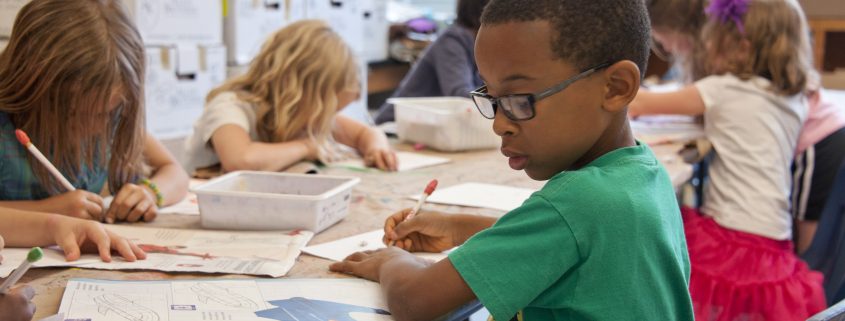




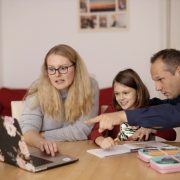



Integration is VERY positive to all children in a program.
Focus on alternative intelligences helps young people negotiate within an ever changing environment. Because all children perceive the world differently school with variously abled other persons allows them to feel comfortable and accept their own quirks and ideas.